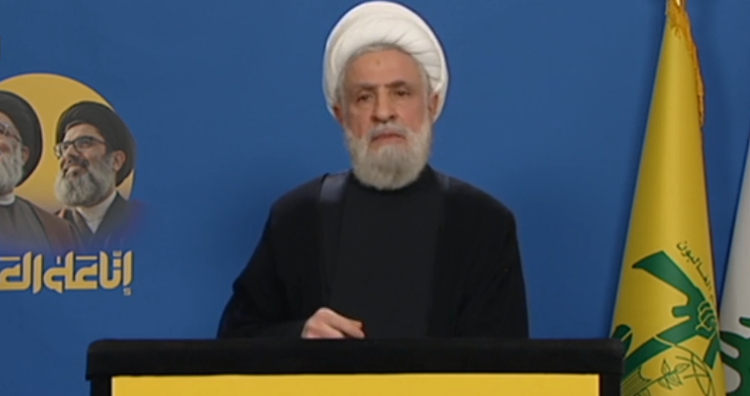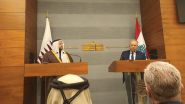
Hezbollah’s deputy secretary-general, Naim Qassem, took advantage of the ninth commemoration of the death of Hezbollah commander Mustafa Badreddine in Syria to revisit political issues previously addressed in his public speeches.
Qassem began with a eulogy recounting the "military feats" of what he described as "a true leader of the Islamic resistance," tracing Badreddine’s path from his adolescence—including his combat against Israel in support of Palestine and Iran—up to his death in Syria.
At this point, he abruptly declared: “He went to Syria for the sake of the resistance. It had nothing to do with any internal conflict!”
This biographical narrative then served as a gateway to political commentary.
Qassem asserted: “We support a unified Syria, for all its sons to form their government as they wish, away from liquidation and targeting of minorities,” while also condemning repeated Israeli aggression.
He went on to say: “We have opposed an Israeli project since 1948—over 77 years now—that is backed by massive military power and supported by the United States and Western countries. Its goal is to impose a colonialist settlement in the region to reshape the Middle East.”
He accused Israel of consistently resorting to the “nibbling away” of land and the rights of regional populations—a policy which, in his view, only the resistance can thwart. He praised Gaza for its role in the “Flood of al-Aqsa” operation and for standing against what he called “this usurping entity [Israel] that seeks the extermination of human beings and the destruction of life.”
To further illustrate this “nibbling,” Qassem cited the May 17 Agreement, which “imposed many conditions on Lebanon,” and which, according to him, was nullified thanks to “popular opposition” and the resistance of religious scholars. He added that in 2006, it was the “Army, People, and Resistance equation” that overcame Israeli greed.
As in many of his speeches, he returned to the familiar theme of the “victory of the resistance,” its deterrent power, and legendary steadfastness. “Without it, Israel would have kept positions in Beirut or Saida,” he exclaimed. Continuing in this vein, Qassem declared: “These are real achievements. That’s why we say the resistance is both necessary and required.” He emphasized that the resistance is both a “defensive choice” and a “political vision” that must be preserved against Israel, which, he said, now seeks to eliminate the resistance through political means, since military attempts have failed.
Qassem demanded more effective action from the Lebanese state to enforce the ceasefire, reiterating: “Let Israel and its supporters know that we will not yield to pressure. We will confront all forms of conflict. There will be no surrender... No one will succeed in sidelining us.”
He further reaffirmed Hezbollah’s essential role in the upcoming presidential term, stating: “We are an integral part of this mandate.” He also encouraged developing relations with Arab countries “on the basis of mutual interests,” and reiterated—“so that officials do not forget”—Hezbollah’s three simultaneous priorities:
-
Ending Israeli aggression and occupation, and liberating prisoners
-
Reconstruction, which he called “a duty of the government”
-
Building the state, economically and socially
In closing, Qassem highlighted Hezbollah’s role in promoting coexistence, citing their performance in the municipal elections in Haret Hreik as a model, and offering unsolicited advice on the approach to adopt in municipal elections in Beirut:
“We are convinced that in Beirut, one must take into account the particularity of balanced representation, without focusing solely on numbers or political calculations.”



Comments